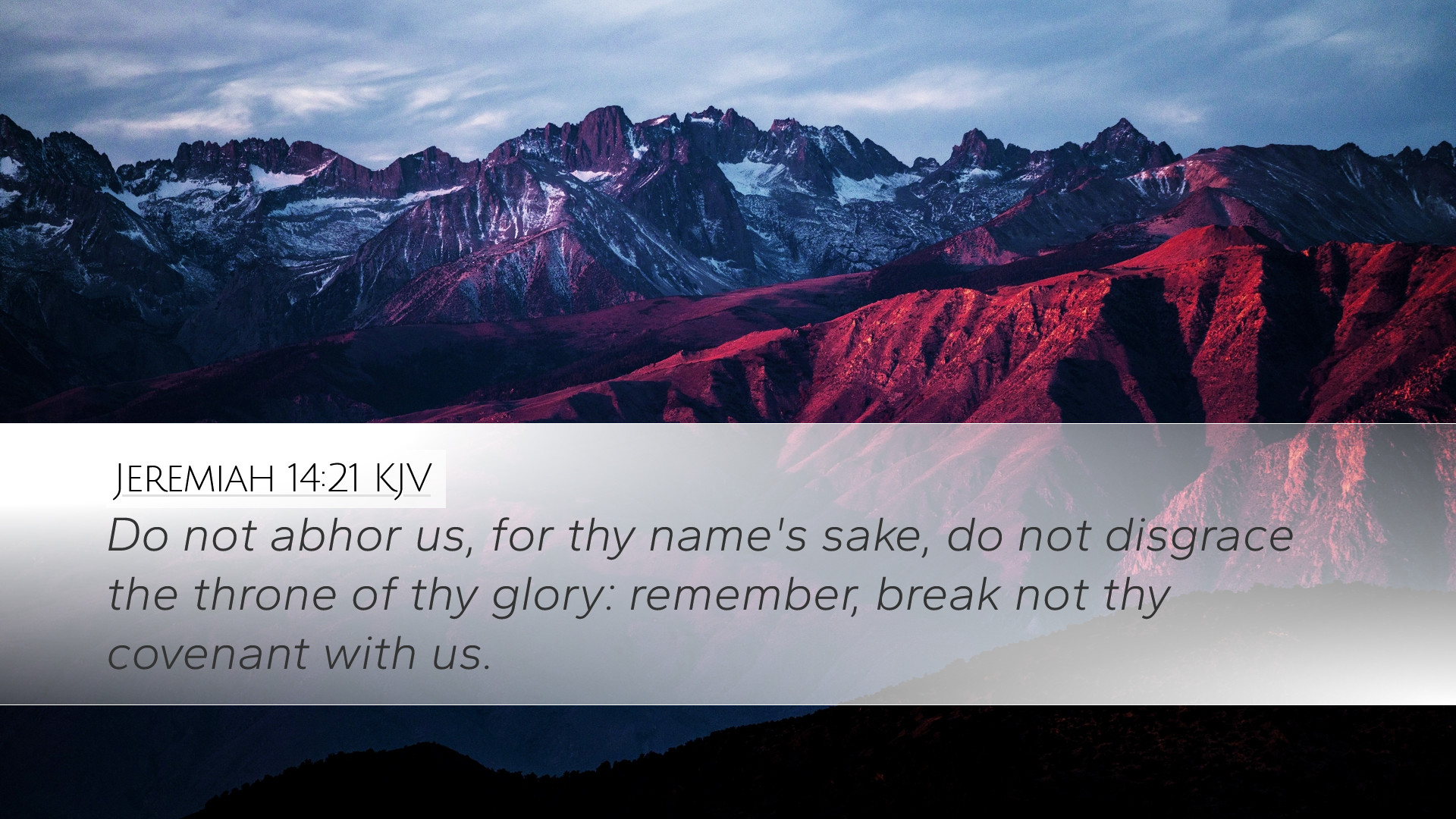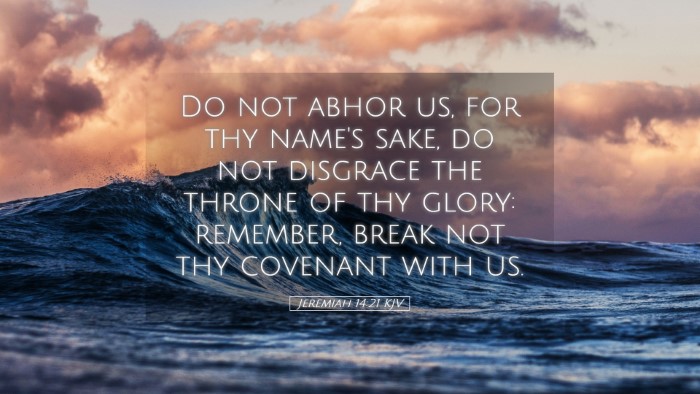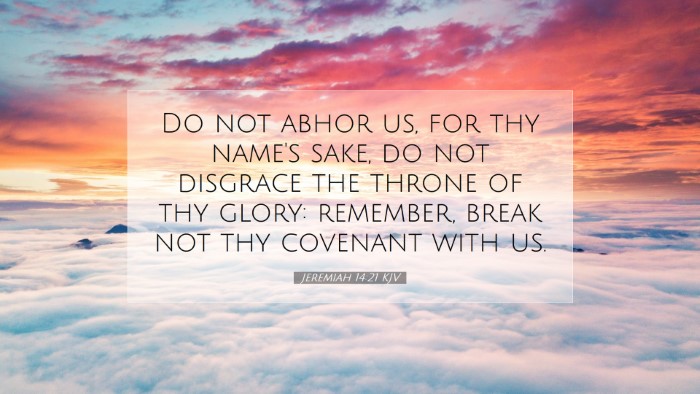Commentary on Jeremiah 14:21
Introduction
Jeremiah 14:21 is a poignant verse that encapsulates the prophet's deep concern for the people of Judah amid their suffering and abandonment of God's commandments. This commentary seeks to explore the overarching themes of divine judgment, repentance, and intercession, drawing insights from the works of Matthew Henry, Albert Barnes, and Adam Clarke.
Verse Context
Jeremiah 14:21 states: "Do not despise us for your own sake, O Lord; do not dishonor your glorious throne; remember and do not break your covenant with us."
This plea reflects the urgency and desperation of the people who are aware of their sins but appeal to God's faithfulness and mercy. The phrase “for your own sake” highlights a key theological point: God's own glory and holiness are at stake in how He relates to His covenant people.
Key Themes
- Divine Judgment and Suffering
Jermiah’s lamentation in this chapter arises from the severe drought and the consequent suffering that has befallen the land. The calamities faced are emblematic of the broader spiritual drought in Judah, where the absence of God's favor is felt as a direct consequence of their disobedience. Henry points out that the people’s miseries are not accidental but are providentially allowed to stir them towards repentance.
- Intercessory Prayer
Jeremiah assumes the role of an intercessor, speaking to God on behalf of the people. Albert Barnes emphasizes the necessity of intercession, noting that genuine repentance often requires a mediator. This reinforces the biblical principle that leaders must stand in the gap, beseeching the Lord for mercy on behalf of their communities.
- Covenant Relationship
The invocation to “remember and do not break your covenant with us” signifies the hope rooted in God’s unchanging nature. Clarke explains that God’s covenants are steadfast, and believers are encouraged to invoke their historical relationship with God as a basis for appeal. This covenant loyalty underscores God’s commitment, even when His people falter.
- God’s Glory and Integrity
The call not to “dishonor your glorious throne” reflects an understanding of God’s reputation among the nations. Henry notes that God’s actions are not only about the people of Judah but how they reflect His character and sovereignty to the world. The acknowledgment of divine glory enables believers to grasp the magnitude of their relationship with the Creator.
Theological Implications
The plea made in Jeremiah 14:21 may serve as a model for understanding how Christians today relate to God in times of distress. The framework of this verse encompasses key theological discussions of grace, repentance, and the believer's identity before the sovereign God.
Impact on Leadership
Pastors and church leaders can draw from Jeremiah’s model as they navigate congregational challenges. Intercession is not merely an act of prayer but a reflection of a shepherd’s heart towards those they lead. The integrity of spiritual leadership mirrors God's own, where the leader is called to plead for the flock while fostering a culture of repentance.
Understanding of God’s Justice and Mercy
This verse invites deeper reflection on God’s dual nature of justice and mercy. The awareness of past failures should not lead to despair but be viewed through the lens of divine mercy that seeks restoration. Observing the narrative context, scholars like Barnes argue that repentance is a precursor to renewed fellowship with God.
Application for Modern Believers
As contemporary believers reflect on their lives, Jeremiah 14:21 invites an examination of personal and communal relationships with God. The call for remembrance serves not just as an appeal but an encouragement to keep God's past faithfulness in consideration as they face their trials.
- Encouragement to Pray: Believers are encouraged to engage in consistent and fervent prayer, recognizing their dependence on divine mercy.
- Repentance as a Community: The communal aspect of sin and consequence calls for collective repentance. Congregations are called to corporate confession and emphasis on seeking the Lord earnestly.
- Advocacy for One Another: Just as Jeremiah interceded, Christians are encouraged to advocate for one another, upholding the needs and struggles of the community before God.
- Clinging to God’s Promises: The reminder of God's covenant encourages believers to hold fast to His promises and to seek refuge in His character, especially during difficult seasons.
Conclusion
In summary, Jeremiah 14:21 provides a rich tapestry of insights that reflect the struggle of Israel and their covenant relationship with God. The themes of divine judgment, intercessory prayer, covenant faithfulness, and God’s glory comprise essential tenets of faith for pastors, students, theologians, and scholars alike. In the heart of this verse lies an invitation to seek God's mercy, to engage earnestly in prayer, and to remain steadfast in faith amid trials.


